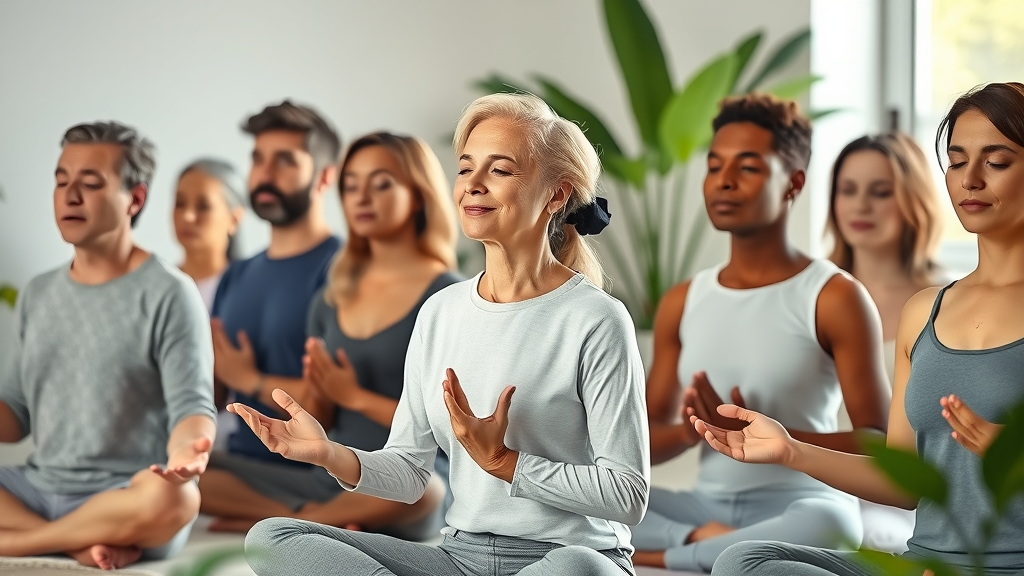Did you know that people who consistently apply self-care strategies lower their risk of stress-related illnesses by an impressive 30% ? If you’re looking for a way to boost your mental health, cultivate a sense of balance, and take control of your daily life, then self-care is the key. In this guide, you'll discover evidence-based self-care strategies that go beyond the basics—empowering you to manage stress and anxiety, improve health and wellbeing, and build a daily routine that truly transforms you from the inside out.
What you'll learn: Why self-care strategies are vital for mental health, how to reliably build and maintain self-care practices, and actionable steps to personalize your journey. Ever wondered which daily habits can make the most difference? Or how progressive muscle relaxation fits into your routine? Read on to unlock answers and practical techniques that will elevate every area of your life.
The Surprising Truth: Why Self-Care Strategies are Essential for Mental Health
"Studies show that individuals who practice effective self-care strategies experience a 30% lower rate of stress-related illnesses." — National Institute of Mental Health
In today’s fast-paced world, crises and constant change can wear down even the most resilient individuals. The science is clear: self-care strategies are not just a luxury—they are a pillar of vibrant mental health and wellbeing. These conscious acts, from daily mindfulness practices to scheduling regular digital detox time, aren't simply about pampering yourself. They're foundational routines that help manage stress, regulate the nervous system, and maintain emotional equilibrium, all of which contribute to your overall sense of wellness.
No single approach to health and wellbeing is universally effective, but self-care strategies provide a flexible framework designed to help you address unique challenges, improve resilience, and reduce stress and anxiety. Whether you’re spending time on progressive muscle relaxation or simply making time to journal, every positive action strengthens your mind and body. Ultimately, prioritizing self-care strategies allows you to not just react to daily life but to thrive—shaping habits that protect and enhance your long-term wellness.
How self-care strategies directly impact your mental health and overall health and wellbeing
There’s powerful evidence showing how self-care strategies benefit your mental health. Regular self-care habits lower the risk of anxiety and depression, boost your mood, and foster a deeper sense of satisfaction in everyday life. These strategies—such as progressive muscle relaxation, mindful breathing, and journaling—activate brain areas responsible for regulating mood and impulse control, thus supporting a healthy nervous system and physiological balance.
By making time for self-care, you’re not only reducing stress but improving sleep, energy levels, and your ability to cope with daily challenges. The mind and body respond positively to managed stress, with lower cortisol levels, fewer headaches, and improved focus and productivity. Prioritizing daily self-care is a proactive way to manage both mental health and overall health and wellbeing, creating a foundation for resilience no matter what arises. When you spend time in positive, restorative activities, your emotional and physical health benefit in all areas of your life.
As you explore ways to enhance your daily self-care, it’s worth noting that nutrition and sleep play a pivotal role in your overall wellbeing. For example, incorporating certain foods into your evening routine—like kiwis—has been shown to support better sleep quality and complement other relaxation techniques. Discover the science-backed benefits of eating kiwis before bed for improved sleep and see how dietary choices can amplify your self-care results.

Unlocking the Power of Consistency in Self-Care Strategies
Consistency is the cornerstone of success with self-care strategies . While it’s tempting to view self-care as occasional treats or emergency measures, research says daily routines yield the most powerful health and wellbeing gains. When self-care is built into your everyday life—whether through morning mindful breathing, a dedicated digital detox hour, or weekly muscle relaxation exercises—it becomes second nature. The repetition helps to rewire your brain, solidifying positive habits and reducing the impact of daily stress.
Developing consistent self-care practices doesn’t require hours of free time. Simple micro-habits, such as setting a hydration reminder or taking five minutes for muscle relaxation before bed, can add up to significant improvements over time. The key is to make time for these activities in a way that feels sustainable. Real-life examples include creating a nightly relaxation ritual, establishing boundaries for downtime, or checking in with yourself through daily journaling. These habits build resilience, boost your mood, and support both mental health and overall wellbeing by giving you the tools to manage stress and anxiety as life unfolds.
- Daily routines that enhance health and wellbeing
- Why self-care strategies are the foundation of progressive muscle relaxation and stress reduction
- Real-life examples of sustainable self-care habits
Exploring Evidence-Based Relaxation Techniques for Improved Health and Wellbeing
Relaxation techniques are an evidence-based cornerstone of any effective self-care strategy . By harnessing proven methods—such as progressive muscle relaxation—you can quiet the mind, soothe the nervous system, and boost your overall health and wellbeing, no matter how stressful your daily life gets. These practices have far-reaching effects, from improving sleep quality to decreasing anxiety and promoting physical health. Understanding and incorporating relaxation strategies into your routine is essential for comprehensive self-care.
The science behind progressive muscle relaxation as a self-care strategy
Progressive muscle relaxation is a time-tested self-care strategy that involves intentionally tensing and releasing muscle groups in sequence, allowing you to become more aware of how physical tension builds up and learning to release it. This method, developed by Dr. Edmund Jacobson in the 1920s, is rooted in research showing that reducing muscular tension can calm the mind, manage stress, and lower symptoms of anxiety. When practiced regularly, progressive muscle relaxation helps you build a strong connection between mind and body, teaching your nervous system to shift from a state of alertness to relaxation.
Progressive muscle relaxation is not only effective for mental health but can also aid in physical health—reducing headaches, muscle pain, and even high blood pressure. People who include this self-care strategy in their daily life report feeling more grounded, focused, and equipped to handle stressful situations. As a bridge between psychological and physical wellness, progressive muscle relaxation is a versatile, accessible means to strengthen your total health and wellbeing.
How relaxation techniques support your mental health
Integrating relaxation techniques into your routine directly benefits mental health. Practices such as mindful breathing, meditation, and progressive muscle relaxation lower your heart rate, decrease stress hormones, and help regulate emotions. This not only reduces feelings of stress and anxiety but also increases your capacity to focus, problem-solve, and enjoy factors that boost your mood. By regularly taking time for these techniques, you give your mind and body the chance to recover from the constant demands of modern life.
Whether you spend time on calming routines before bed, utilize mindfulness practices during work breaks, or use muscle relaxation in moments of stress, these self-care strategies build internal resources of resilience and adaptability. They anchor you in the present, making it easier to manage stress and anxiety, and ultimately enhance all areas of your life. The investment of a few minutes daily pays exponential dividends for your mental and physical health.
Incorporating muscle relaxation into your daily self-care strategies
To make progressive muscle relaxation a sustainable part of your self-care routine, begin by setting aside a specific time each day, such as after waking or before bedtime. Use a guided audio script, or simply move through each muscle group—tensing for five seconds, then slowly releasing. Focus on your breath and the contrast between tension and relaxation. This deliberate practice calms your nervous system and helps transition from stress to a state of rest and repair.
Making time for muscle relaxation is especially effective when paired with other self-care strategies, such as morning mindful breathing or a calming evening routine. If you’re short on time, even a brief five-minute session targeting common tension areas (like your shoulders and jaw) can improve health and wellbeing. Over time, you’ll notice reduced stress levels, better sleep, and an enhanced sense of body awareness that supports every area of your daily life.
Self-Care Strategies for Enhancing Mental Health Every Day
Successful self-care isn’t just about relaxation—it's about building daily habits that benefit your mental health and overall health and wellbeing. By thoughtfully selecting practices that address your individual needs and stress triggers, you create a toolkit to manage the ups and downs of daily life. This approach not only helps you cope in the moment but strengthens resilience for the long term.
- Mindfulness and meditation for mental health
- Journaling and expressive writing
- Digital detox and its impact on health and wellbeing
- Sleep hygiene as a pillar of self-care strategies
Mindfulness and meditation are powerful relaxation techniques that help ground you in the present and break cycles of stress or worry. Journaling and expressive writing offer healthy outlets for processing emotions and setting intentions, which supports mental health and increases clarity. Digital detox —setting boundaries with social media and screens—has been shown to reduce anxiety and enhance your connection to the present. Finally, sleep hygiene is often overlooked but is critical for mental and physical recovery each night. Consider establishing a relaxing pre-bed ritual: dim lighting, gentle stretching, and no screens in the hour before sleep.

Practical Self-Care Strategies: Step-by-Step Techniques You Can Start Today
Understanding self-care strategies is one thing—implementing them effectively is another. Here, we break down practical self-care methods you can start immediately to improve your health and wellbeing. Whether your goal is to manage stress, sleep better, or simply spend time cultivating a sense of calm, these actionable steps will help you make positive changes in all areas of your life.
| Strategy | Purpose | How-To |
|---|---|---|
| Progressive Muscle Relaxation | Reduce tension | Follow a guided script twice a day |
| Mindful Breathing | Calm the mind | Practice 5 minutes after waking |
| Gratitude Journaling | Boost positivity | Write three things daily |
| Hydration Reminders | Physical wellness | Set hourly alarms |
| Digital Detox | Reduce stress | Screen-free hour before bed |
How to Personalize Self-Care Strategies for Lasting Results
There’s no one-size-fits-all approach to self-care strategies . Your preferences, routine, and stressors are unique, so your self-care plan should reflect that. Personalization increases your commitment and the likelihood you’ll maintain healthy habits, especially when life becomes hectic. The most effective approach is to experiment: test different relaxation techniques, evaluate how they make you feel, and adjust your self-care strategies over time.
Start by assessing your own lifestyle, stress levels, and mental health needs. Identify which self-care strategies spark genuine changes in your mood or energy. For some, mindful breathing and muscle relaxation are transformative; for others, journaling or physical movement provides the most benefit. A balanced routine often includes a mix of mental, physical, and emotional practices. The key is to regularly check in with yourself and update your approach so it stays relevant and effective.
- Assess your lifestyle and mental health needs
- Identify relaxation techniques that resonate with you
- Develop a balanced routine using various self-care strategies
- Regularly review and modify your approach
"Self-care strategies are not one-size-fits-all; personalization leads to sustainability and better mental health outcomes."

Addressing Common Barriers to Self-Care Strategies
Even with the best intentions, many people struggle to make self-care a consistent part of their lives. From limited free time to feelings of guilt or social stigma around taking time for yourself, these barriers can undermine your efforts to improve health and wellbeing. Recognizing these obstacles is the first step toward building a lasting practice.
Overcoming time constraints for health and wellbeing
Lack of time is a top reason people skip self-care strategies. However, you don’t need to overhaul your schedule—start by integrating micro-habits. For example, practice mindful breathing during your morning commute, or use a hydration reminder app during busy workdays. Making time for even a few minutes of progressive muscle relaxation or digital detox can shift your mood and reduce stress. Remember, regular short breaks are more effective than infrequent, lengthy sessions, especially for supporting mental health amidst a packed calendar.
By batching tasks, saying no when you need rest, and prioritizing essential practices, you can protect your health and wellbeing without sacrificing productivity. The goal is to view self-care as a necessity—not a luxury—embedded seamlessly into daily life rather than added on top.
Dealing with guilt and stigma around self-care strategies
Despite the benefits, many individuals feel guilty about taking time for self-care, especially in busy households or high-pressure workplaces. It’s common to internalize the message that caring for yourself is selfish, or to feel pressure to focus solely on others. In reality, neglecting self-care can lead to burnout and diminished mental health, negatively affecting those around you as well.
To shift this mindset, remind yourself that you’re better equipped to help others and meet your specific goals when your own needs are met. Challenge stereotypes by openly discussing your self-care routines, and encourage family, friends, or colleagues to join. Over time, you’ll cultivate a sense of balance, modeling positive self-care strategies for others.
- Setting boundaries for mental health
- Leveraging micro-habits
The Integral Role of Nutrition and Physical Activity in Self-Care Strategies
Nutrition and exercise are core aspects of self-care strategies that have direct effects on both mental and physical health. What you eat, how you move, and your hydration status influence your energy, emotional stability, and resilience against everyday stress and anxiety. Building healthy habits around these areas is essential for optimizing all dimensions of health and wellbeing.
- How nutritious food choices affect mental health
- Simple muscle relaxation routines to include in your day
- Linking exercise with relaxation techniques
Balanced, nutrient-rich meals—featuring fresh fruits, vegetables, whole grains, and lean proteins—help stabilize mood and improve focus. Making time for regular exercise, even gentle stretching or walking, supports muscle relaxation and releases endorphins, essential for managing stress. Integrate these components with other self-care strategies, such as progressive muscle relaxation, to create an interconnected routine tailored to your unique health needs and lifestyle.

People Also Ask: Top Questions About Self-Care Strategies
What are 5 self-care strategies?
Five effective self-care strategies include: practicing progressive muscle relaxation daily, engaging in mindful breathing exercises, journaling for gratitude and self-reflection, maintaining proper hydration, and setting aside designated time for a digital detox. These actions not only reduce stress but also benefit your mental health and enhance your overall wellbeing. Making time for these self-care foundations yields meaningful improvements in all areas of your life.
What are the 5 P's of self-care?
The “5 P’s” of self-care stand for Physical, Psychological, Personal, Professional, and Practical needs. Addressing each area ensures a well-rounded approach to managing stress and anxiety, supporting your mind and body, and helping you stay resilient across all aspects of daily life. Regularly reviewing and reflecting on your habits within these five domains can give you a more comprehensive plan for health and wellbeing.
What are the 7 pillars of self-care?
The 7 pillars of self-care are mental, emotional, physical, environmental, spiritual, recreational, and social . Each pillar represents a critical area of your life where attention and nurturing can vastly improve health and wellbeing. By weaving practices from each pillar into your daily routine, you ensure that your self-care strategies are holistic and aligned with your specific goals.
What are the five 5 areas of self-care?
The five areas of self-care typically refer to emotional, physical, social, spiritual, and intellectual domains. Prioritizing self-care in these areas means setting aside time to engage in meaningful activities, relaxation techniques, social connections, and skills-building that collectively reduce stress, boost your mood, and protect your mental health for the long term.
Guided Progressive Muscle Relaxation Demonstration: An expert demonstrates how to release tension throughout the body in a calming, step-by-step session. Follow along to integrate this evidence-based self-care strategy into your daily routine for immediate stress reduction and improved health and wellbeing.
Watch this step-by-step guide on building a self-care routine tailored to your lifestyle and mental health needs. Discover how to balance work, relaxation, nutrition, and connection to create habits that sustain your mood and resilience every day.
Gain insights from a compassionate mental health professional as they walk you through a variety of relaxation techniques. Learn the science behind muscle relaxation, practical tips on mindfulness practices, and how to spend time intentionally cultivating a sense of wellbeing.

FAQs on Self-Care Strategies
- How often should I practice relaxation techniques? Incorporating relaxation techniques into your daily routine is best. Even short, five-minute sessions can help regulate your nervous system and manage stress, but the benefits increase with consistent, daily practice.
- What if self-care strategies don’t seem to help my mental health? If your self-care routine isn’t yielding results, try personalizing your approach or seeking support from a mental health professional. Sometimes, you need to adjust techniques or combine them with other health services for optimal benefit.
- Are there self-care strategies for busy professionals? Absolutely. Prioritize micro-habits such as mindful breathing during breaks, screen-free meals, and short stretching sessions. Even minimal changes can significantly reduce stress and boost your mood.
- How can I track the impact of self-care on my health and wellbeing? Use a journal or digital app to log your habits and note changes in mood, sleep, and energy. Regular reflection helps you monitor progress and identifies which self-care strategies are most effective for you.
Key Insights for Implementing Effective Self-Care Strategies
- Start small and build sustainable habits
- Tailor self-care strategies to individual needs
- Prioritize consistency for lasting benefits
- Monitor progress and adjust routines as life changes

Take Action: Transform Your Daily Life with Proven Self-Care Strategies
Don’t wait for a crisis to prioritize self-care strategies. Choose one new technique to add to your daily routine, set achievable goals, and celebrate your commitment to wellbeing—today is the perfect day to start transforming your health and happiness.
If you’re inspired to deepen your self-care journey, consider how these strategies can be woven into special moments and major life events. For instance, preparing for a significant occasion like a wedding can be the perfect opportunity to explore new self-care rituals and prioritize your wellbeing from head to toe. Discover how to elevate your anticipation and self-care with expert podiatrist tips and holistic practices by visiting this guide on self-care through wedding anticipation and foot health . Exploring these advanced approaches can help you create a more joyful, balanced, and resilient lifestyle—no matter what milestones lie ahead.
 Add Row
Add Row  Add
Add 




Write A Comment